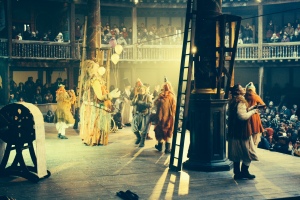 In my studies, I spend a lot of time thinking about why we wear social masks. Whether we realize it or not, we are constantly performing and adjusting our masks to suit the occasion. We play many roles: parent, friend, spouse, employee, citizen, etc. Each role requires us to change the mask.And admit it, sometimes it’s fun to wear a mask. As children, we pretend to be someone we’re not, but as we grow older convince ourselves that such child’s play is no longer acceptable. Unless, of course, we choose acting as a career and then we get to play pretend all of the time. We love dressing in costumes on Halloween, getting our faces painted, and many of us still delight in playing dress-up. The reality is, actors or not, we are still pretending on a regular basis.
In my studies, I spend a lot of time thinking about why we wear social masks. Whether we realize it or not, we are constantly performing and adjusting our masks to suit the occasion. We play many roles: parent, friend, spouse, employee, citizen, etc. Each role requires us to change the mask.And admit it, sometimes it’s fun to wear a mask. As children, we pretend to be someone we’re not, but as we grow older convince ourselves that such child’s play is no longer acceptable. Unless, of course, we choose acting as a career and then we get to play pretend all of the time. We love dressing in costumes on Halloween, getting our faces painted, and many of us still delight in playing dress-up. The reality is, actors or not, we are still pretending on a regular basis.
Do you think I might be advocating phoniness or concealing our true selves? Or maybe that there isn’t a tragic aspect to our need to wear masks? Not a bit of it. What I’m asking for here is a bit of awareness–thinking about what masks we wear and why we wear them. Once we’ve accomplished this awareness, we might have a little fun with wearing masks and turn the tragic into comic, or at least tragi-comic.
The problem with wearing masks occurs when you don’t know who or what you are beneath them. That’s a whole new issue. In order to have any real fun with this whole performance thing, knowing who and what you are is imperative.
My favorite archetypal figure is the Trickster. For those of you who don’t know who or what Trickster is, see Hermes/Mercury, Coyote, folkloric figure Peter Wheatstraw, and for pop culture references, Loki of Thor and The Avengers (deliciously portrayed by Tom Hiddleston), and Petyr Baelish of Game of Thrones (Aidan Gillen). Tricksters are expert performers and wearers of masks. They are chameleons who transform themselves at will to challenge a power structure.
Ralph Ellison noted the American-ness of mask-wearing (I would note that it’s just part of being human):
For the ex-colonials, the declaration of an American identity meant the assumption of a mask, and it is imposed not only the discipline of national self-consciousness, it gave Americans an ironic awareness of the joke that always lies between appearance and reality, between the discontinuity of social tradition and that sense of the past that clings to the mind. And perhaps even an awareness of the joke that society is man’s creation, not God’s. (“Change the Joke and Slip the Yoke,” Shadow and Act)
Note that last bit about society being our creation. It is a construct, and in order to operate within and cope with that construct, we perform roles, create myths, and play along with a joke. See where I’m going with this? Wearing our masks can be an act of creation, and if we so choose, a source of amusement and empowerment. A mask can just as easily be a challenge to a power structure as it is a an acceptance of one.
What mask are you wearing today? How can you make it a source of empowerment?
VERY perceptive and thought provoking.